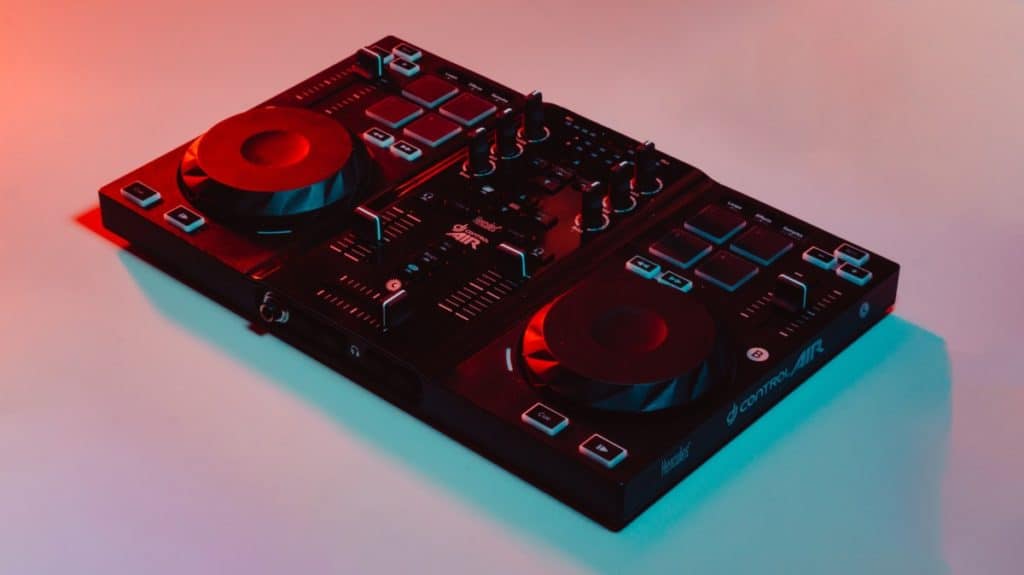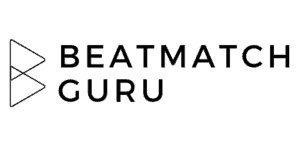
DJ equipment is massively evolving and there’s a lot more variation in format to choose from. I’ve personally been a bit overwhelmed by all the digital DJ equipment out there so I’ve been investigating into the differences.
What’s the difference between a DJ controller and DJ mixer? A DJ Controller device has built in turntables and mixer which connects to DJ software allowing DJs to mix music. A DJ Mixer requires turntables or CDJs to plug into each channel before a DJ can mix music.
Now let’s look into the specifics of DJ controllers and DJ mixers. This article should cover off any points to consider if you’re a beginner looking to invest in DJ equipment or upgrade to a more modern digital DJ setup.
Looking to become better at DJing?
What is a DJ Controller?
A DJ Controller is an all-in-one device containing a mixer and two turntables purpose built for connecting to a laptop/PC containing DJ software.
A DJ Controller typically contains:
Functionality
- 2 x Turntable jog wheels to control each song track
- 2 to 4 channels depending on the controller model
- EQ knobs to control high, mid and low per channel
- Digital display to see the audio wave of each song
- Effects pad controls & buttons per turntable
- Cross fader to mix tracks together
- DJ Software e.g. Serato, Traktor and Rekordbox
Inputs / Outputs
- USB connections
- Microphone input
- Master out
- Phono/line inputs
Note: the above is a generalised list of points for DJ controllers, there are lots of different versions that offer varying degrees of functionality. Price usually dictates the level of functionality too, and of course the brand does also e.g. Pioneer.
What Does a Controller do for DJs?
Once a DJ Controller is connected to a laptop the software allows DJs to drag and drop MP3 music files onto each turntable. The DJ controller then gives a great deal of control over a particular song such as effects or EQ, and then ultimately using the crossfader to mix into another track.
In some cases DJ Controllers allow you connect turntables, therefore technically offering mixer capability. So for example CDJs can be connected to a DJ Controller, offering DJs flexibility to mix music from turntables as well as from a laptop.
Benefits of DJ Controllers?
Portable. These devices are great for travelling with as they are generally lightweight and easy to carry to different gigs. Being a highly portable sort of device gives great appeal to a lot of people. Setting up older traditional equipment such as turntables or even CDJs can take a lot more effort in transporting and setup time, for example if you DJ at weddings or parties.
Space savers. Great for beginner DJs just starting out who might not have much space at home. More traditional setups such as a 2 or 4 channel mixer with vinyl turntables take up way more space in comparison to a DJ Controller.
Mixer capabilities. There are certain DJ Controllers out there that offer mixer capabilities, such as the Pioneer DDJ-RR, see YouTube demonstration of it being used here. This gives great flexibility if you’re a mobile DJ playing a different locations. Especially if there are CDJs at a venue, that gives you the opportunity to plug in your DJ Controller to CDJs and use the controller as a mixer.
Value for money. Having researched online for DJ controllers the price range can vary a lot from £84 to around £2,000. The quality and functionality may vary according to how much you’re willing to pay for a particular make of DJ Controller. So be sure to do your homework being investing your money by checking out product reviews and forums etc.
Another value for money feature is that some DJ controllers come with DJ software which is a major bonus as stand alone software like Serato costs around £130 basic to £300 full suite, whereas Traktor costs around £90 basic. Not a bad saving here!
Finally, the biggest point related to price for DJ controller is that the entry price point is great for beginner DJs starting out. Especially if you’re just looking to try out DJing as hobby, the investment is really low. Cheapest DJ controller I’ve seen on Google is £84 from djsuperstore.com, the Numark PartyMix DJ Controller
What is a DJ Mixer?
A DJ Mixer is a hardware device that is stand alone, it’s not necessarily reliant on DJ Software and a laptop to play music. Each DJ mixer requires turntables to be plugged into each channel before music can be played. DJ Mixers contain a minimum of 2-channels and are very common with 4-channels, sometimes more.
DJ Mixers have very similar controls and features of DJ Controllers. The key differences are that they don’t contain turntable jog wheels and rely on separate turntable devices to be connected to play and mix music together.
A typical DJ Mixer contains:
Functionality
- 2 to 4 channels
- EQ knobs to control high, mid and low per channel
- Channel effects control buttons
- Master effects control buttons
- Cross fader to mix tracks together
Inputs / Outputs
- USB connections
- Microphone input
- Headphone output – Jack / mini-Jack
- Master out
- Phono/line inputs
- MIDI output
- AC Mains
- Earth Ground Terminals
What Does a Mixer do for DJs?
A mixer allows DJs to connect vinyl turntables, CDJs, DJ samplers, beat pads and even guitar FX units. The main point of difference here is that a mixer is versatile at allowing DJs to mix music from different formats. Control of EQ, channel levels and effects allow DJs to mix and blend songs together, which is similar to a DJ Controller.
Benefits of DJ Mixers?
Versatile. Allowing different music formats to be mixed together. Multiple devices can be connected giving a DJ to add in sounds from a sampler, for example Machine from Native Instruments or AKAI’s MPD 226 which is what I have setup mainly for music production though.
Independent of Software. Unlike DJ Controllers, mixers do not require DJ software to operate, in some cases this can save you money. Also depending on your current setup it’s not necessary that you need a laptop. CDJs and vinyl turntables operate just fine without a laptop. Having said that you can use a laptop with Serato’s Scratch Live setup, converting analogue to digital, allowing you to play MP3s on each turntable.
More common in clubs. If you’re looking to DJ in clubs and bars, then it’s certainly worth getting to know your way around a mixer. You might of already noticed that Pioneer is a popular brand that features their DJ equipment in a lot of clubs.
Amongst my DJing friends, this is certainly a topic of conversation about Pioneer featuring as an industry standard. For example, the Pioneer DJM-900NXS2 is a more prominent DJ mixer in clubs, check this video out by Pioneer themselves, it’s an awesome video showcasing and highlighting great features on the mixer, my favourites being able to plugin in headphones using a Jack or Mini Jack and plugging in a USB to access your music.
Key Differences Between a DJ Controller and DJ Mixer
To wrap up all of the information presented above, here are the top key differences between the two devices.
- Portability – as a DJ controller is all in one, potentially lighter in weight and dimensions you could argue that it’s much easier to drag around with you to parties that you’re playing.
- DJ Software – mixers don’t rely on DJ Software but there’s something to be said for high end DJ Controllers allow you to plugin CDJs/turntables.
- Entry Level – the entry point for DJ controllers, and I mean for a brand new controller is super low in comparison to buying a mixer.
- Less Equipment Required – as mentioned above about DJ controllers being a space saver, they certainly require less space in comparison to a full mixer and CDJs setup for example.
Final Thoughts…
Having looked on Google trends, the popularity of the search terms “DJ Controllers” vs “DJ Mixers” the amount of searches are nearly on par. That to me says a lot about how DJ equipment and technology is evolving. Especially looking at some of the features that the high end professional club mixers offer. It’s going to be very interesting to see how mixers evolve to fit in with modern day technology and software.
I’d say DJ Controllers are great for entry level DJs starting out. Mixers can be bought on the cheap but then you have to consider buying turntables or CDJs too, depending on how much budget you have second hand turntables/CDJs are always available.
It’s a really good thing to try all different types and models of DJ gear out before buying anything. See if a friend has a DJ controller or go into a shop that has loads of equipment to try out. I was absolutely overwhelmed when I went to GAK in Brighton, it’s an amazing shop. So really it comes down to the format in which you like best, the budget you have and your future vision for becoming a DJ.
Related Questions
What does CDJ Stand for DJ?
CDJ stands for ‘Compact Disk Jockey’.
What do CDJs do?
A CDJ plays music from Compact Discs allowing DJs to mix music from one CDJ to another with the use of a mixer.
Do I need a Mixer with my DJ Controller?
A DJ Controller can function without the use of a mixer. A DJ controller can act as a mixer A mixer can support extra music equipment such as microphones to function with a DJ Controller.

